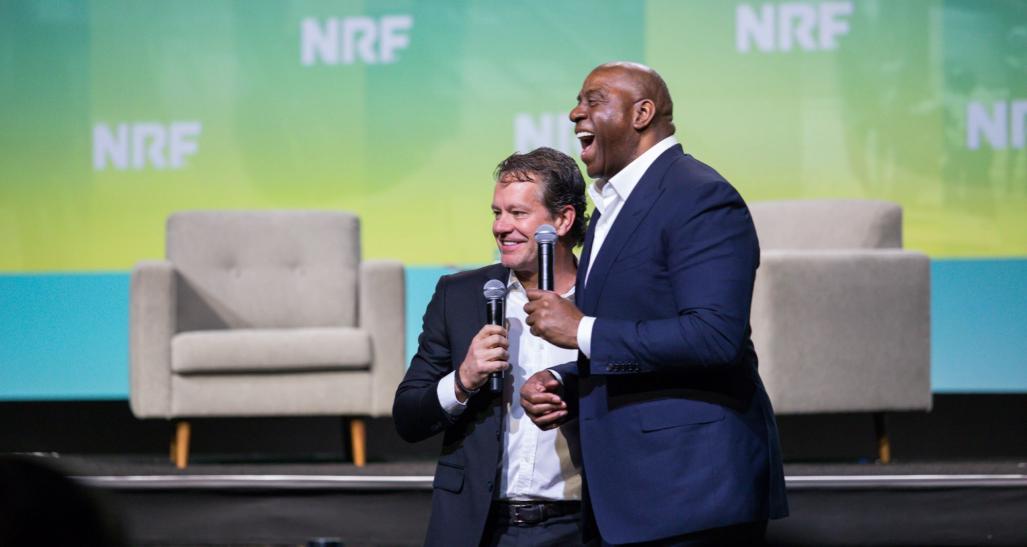
John Furner, president and CEO of Walmart U.S., and Earvin "Magic" Johnson, NBA legend and chairman and CEO of Magic Johnson Enterprises, at NRF 2024: Retail's Big Show.
Earvin “Magic” Johnson brought his A game to NRF 2024: Retail’s Big Show, jumping off the stage to “walk and talk and be with the people” while sharing thoughts on success, hard work, giving back, choosing the right team and maintaining the right mindset.
“I don’t do last place,” he told John Furner, president and CEO, Walmart U.S., who briefly basked in being “taller” than the 6’9” NBA legend before moving to sit on the edge of the stage. Arguably, Johnson is well accustomed to being first. He regaled the audience with stories of believing in — and accomplishing — the seemingly impossible during his conversation with Furner.
“I’m supposed to introduce you,” Furner said. “But let’s just start with, I think everybody here knows who you are.” Though they might not know the extent of his achievements.
Preparation equals success
In addition to his sports prowess — Hall of Fame member, Olympian, three-time NBA MVP and winner of the Jackie Robinson Sports Award, among many other accolades — Johnson is chairman and CEO of Magic Johnson Enterprises, an investment conglomerate that provides high-quality products and services that focus primarily on ethnically diverse and underserved urban communities.
Browse photos, blog posts, videos and more from NRF 2024: Retail’s Big Show.
He also owns stakes in the Los Angeles Dodgers, the WNBA’s Los Angeles Sparks, Major League Soccer’s Los Angeles FC and the NFL’s Washington Commanders. (He has 14 championship rings, he said, and is hoping to add a Super Bowl ring “soon.”)
As the presentation took place on Martin Luther King Jr. Day, Johnson noted that nothing he had accomplished would have been possible without King. He also attributed his success to surrounding himself with the right people, whether mentors or colleagues.
“For me, if I’m prepared, if I’ve done everything I’m supposed to do, I feel that I’m going to win,” he said. “And I only hire people like that — the same type of mindset, the same type of dedication, the same type of discipline, the same type of focus. That’s what I want. I want people running with me that have that same mindset.”
And if others aren’t there yet, he has historically helped get them there.
Learning to lead
Consider the Los Angeles Lakers in the 1979-80 season. When Johnson joined the Lakers, he was tested by the veterans on the team, but he was ready. The Lakers went all the way to the finals against the Philadelphia 76ers, but team captain Kareem Abdul-Jabbar suffered an injury and couldn’t play Game 6.
The team was dejected and discouraged without their leader, but Johnson, as a rookie, spent the five-hour plane ride with the team working on their mindset. He encouraged them, saying, “Never fear, Magic is here.”
The next day, the team won without Abdul-Jabbar — and Johnson had 42 points, 15 rebounds and seven assists. He was named the NBA Finals MVP, the first and only rookie to do so. Quite simply, he loves a challenge and proving people wrong.
He first became a leader four weeks into high school, he said. He had been in Black schools all his life, and then was bused across town to an all-white school. His first three weeks in the school were marked by racial tension. Then, during the fourth week, the school principal met him at the bus and took him into his office, along with the school’s best football player, who was white.
The principal told the football player that he was going to stop the white kids from fighting, and that Johnson was going to keep the Black kids from fighting. He asked the principal why he didn’t get a junior or senior to talk to the Black students, as he had just arrived.
“And he said, ‘They won’t listen to them, but they’ll listen to you.’ That’s when I became a leader outside of sports. And sure enough, guess what happened? We stopped fighting. He did his job. I did my job.”
Making others better
Michigan State followed, where he came across that “blond-headed dude,” Larry Bird. Bird, he said, “made me play my best basketball.” That’s what competitors do; they push you to be better.
Johnson addressed the younger generation in his talk, noting that they don’t always like to hear critical feedback from their older counterparts. “Young people, we love you. But our job is to make sure you’re successful.”
Furner agreed that “feedback is a gift,” and Johnson shared that as leaders, “our job is to make those who work with us better.” He wrapped up with hopes that as a culture, we can return to respecting each other. “We’ve lost our way a little bit,” he said. It will take all of us to change our communities, cities, states and nation for the better.


